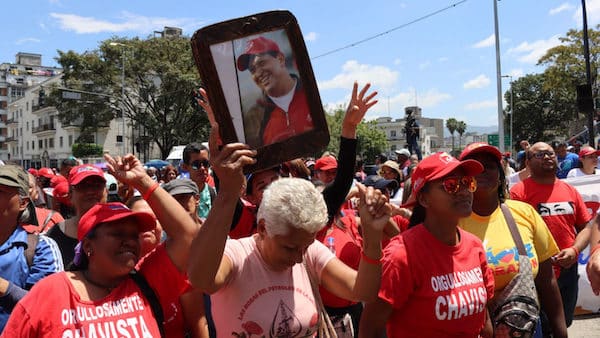March 5 marked ten years since the passing of Commander Hugo Chávez, former president of Venezuela and the father of the Bolivarian Revolution. Chávez was Venezuela’s president from February 2, 1999, until his death on March 5, 2013.
Chávez inaugurated a new period in Venezuela’s history. Through his comprehensive and inclusive social and economic policies, he brought back dignity and pride to the Venezuelan people and transformed the social reality of the country. He forged important projects for Latin American unity and integration such as the Community of Latin American and Caribbean States (CELAC), the Bolivarian Alliance for the Peoples of Our America—Peoples’ Trade Treaty (ALBA-TCP), and the Union of South American Nations (UNASUR). He died at the age of 58, following a two-year battle with cancer.
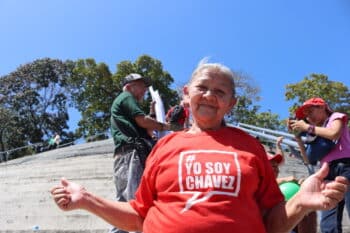
“I am Chávez” t-shirt. (Photo: Zoe Alexandra)
On the tenth anniversary of his death, thousands of Venezuelans took to the streets of the capital Caracas to pay homage to Chávez and ratify their commitment to defend his anti-imperialist and socialist legacy. Workers, students, members of political organizations, social movements and trade unions gathered at different points in Caracas and marched together to the Cuartel de la Montaña, where the mausoleum with Chávez’s remains is located. They chanted slogans such as “Chávez didn’t die, he multiplied!”, “I am Chávez,” and “Chávez is alive.”
María Elena Blanco, member of the political team of the Urban Planning Organization of Macarao parish, told Peoples Dispatch,
Urban Planning Organizations of Caracas feel proud of the legacy of our President Hugo Chávez, continued by Nicolás Maduro. We are thankful to the Bolivarian Revolution. As a result of a natural disaster, our Commander Chávez ordered us to build our own house wherever there was a vacant lot and we did so. Today is the tenth anniversary of the regrettable loss of our Commander, but for us he will always be alive. For us Chávez was a father and a mother. We will always remember him.
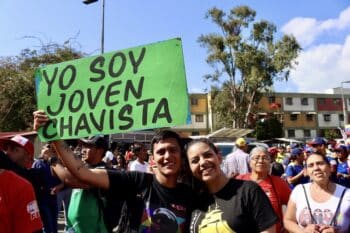
“I am a young Chavista”. (Photo: Zoe Alexandra)
Likewise, Yaritza Mota, a teacher in 23 de Enero parish, told Peoples Dispatch, “A day like today, for us Venezuelans, for us teachers, is an unforgettable day because for us Chávez is still alive, he is still present.” She continued,
We cannot forget that Venezuela was declared free of illiteracy thanks to the wonderful management of our unforgettable and eternal Commander Hugo Chávez Frías. We cannot forget that we increased the enrollment in elementary school, middle school, high school, even at the university level thanks to Chávez and his policies, which are now continued by President Nicolás Maduro. In Venezuela, everyone studies. In Venezuela, education is free and of good quality.
Leaders from across Latin America such as former Cuban President Raúl Castro, Bolivian President Luis Arce, Nicaraguan President Daniel Ortega, Prime Minister of Saint Vincent and the Grenadines Ralph Gonsalves, former Bolivian President Evo Morales, and Former Ecuadorian President Rafael Correa traveled to Caracas to join the events organized in Chávez’s honor.
At the Cuartel de la Montaña, along with Venezuelan political leaders, high-level government officials and military authorities, international leaders also placed flowers on Chávez’s tomb.
International Meeting on the Importance of Chávez’s Bolivarian Revolution
As part of the activities to honor the revolutionary leader, hundreds of leaders of trade unions and people’s movements as well as intellectuals from across the world gathered in Caracas to take part in the International Meeting on the Importance of Bolivarian Thought of Commander Hugo Chávez in the 21st Century. The event took place between March 3 and 5. During the seminar, activists and intellectuals reflected on the anti-imperialist and anti-capitalist legacy of Chávez and ratified its validity in the 21st century.
Cuba solidarity activist and co-executive director of the Peoples Forum, Manolo de los Santos, stated,
If we want to celebrate Chavez’s legacy and say that we are Chavistas, we must raise a permanent campaign against imperialism. The planet faces its greatest dilemma. Either the planet survives or imperialism survives.
Meanwhile, Evo Morales highlighted,
Fidel and Chávez broke that fear of speaking against imperialism, capitalism. For me, the empire is defeated, it has been defeated by the peoples of Latin America in the Cold War.
“Chavista thought is the trench in the fight against capitalism that tries to subdue us to plunder our natural resources,” Morales said.
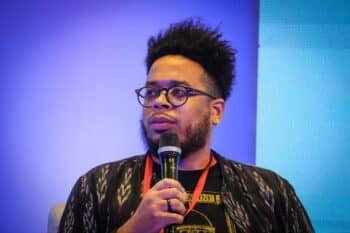 At the closing ceremony of the tributes dedicated to Chávez, held at the Teresa Carreño theater in Caracas, Commander Raúl Castro applauded the revolutionary spirit of the Venezuelan people, who have been resisting the U.S. attacks, staying loyal to Chávez’s legacy.
At the closing ceremony of the tributes dedicated to Chávez, held at the Teresa Carreño theater in Caracas, Commander Raúl Castro applauded the revolutionary spirit of the Venezuelan people, who have been resisting the U.S. attacks, staying loyal to Chávez’s legacy.
We have witnessed the aggressions and the economic war to overthrow the Bolivarian process, but we have proudly witnessed that the Venezuelan people know how to defend their conquests and have not deceived Chávez.
Likewise, President Maduro also stressed,
We have applied the Hugo Chávez formula on everything in these ten years, it has been the formula of connecting, mobilizing, activating the strength of the people at all junctures.
“Always with the people, never without the people, go with the joy, hope, criticism,” said Maduro.
The Bolivarian Revolution
Chávez, when he was first sworn in as the President of Venezuela, pledged to democratically reform the 1961 Constitution and lay the foundations for a new inclusive and social constitution. On the day he was inaugurated, he began the revolutionary process and called for a referendum for the creation of a National Constituent Assembly to write a new Constitution, based on the principles of the Liberator Simón Bolívar: socialism, nationalization and a state-led economy.
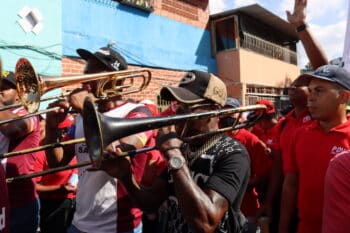 The plebiscite for the drafting of a new Constitution was approved by 87% of the vote. On December 15, 1999, the constitutional draft that established a new social and people-centric model of the state was approved with 71% of the votes. It also renamed the country as the Bolivarian Republic of Venezuela.
The plebiscite for the drafting of a new Constitution was approved by 87% of the vote. On December 15, 1999, the constitutional draft that established a new social and people-centric model of the state was approved with 71% of the votes. It also renamed the country as the Bolivarian Republic of Venezuela.
Chávez’s rule marked the end of the Fourth Republic, a time marked by social inequality, neoliberal economic policies and abuse of power, and the beginning of the Bolivarian Revolution, a process of political, economic, social and cultural transformation of Venezuela based on the pillars of democracy, independence, peace, social justice and sovereignty.
Chávez introduced several policies based on the population’s access to food and housing, free health and education, promotion of employment opportunities and the extension of social security. During his administration, the rate of hunger, poverty and extreme poverty reduced by more than 50% in Venezuela. Higher education and university education became the right of all Venezuelans. Through his social housing program called the Great Housing Mission of Venezuela (GMVV), so far over 4 million homes have been delivered to low-income people at a low cost or free of charge, depending on their income.
These social programs have been sustained by the current government of the United Socialist Party of Venezuela (PSUV), led by President Maduro, despite the brutal economic sanctions imposed by the United States and its allies against the country.
The Venezuelan people have been defending Chávez’s Bolivarian Revolution, braving the impacts of cruel commercial, economic and financial sanctions imposed by the U.S.

